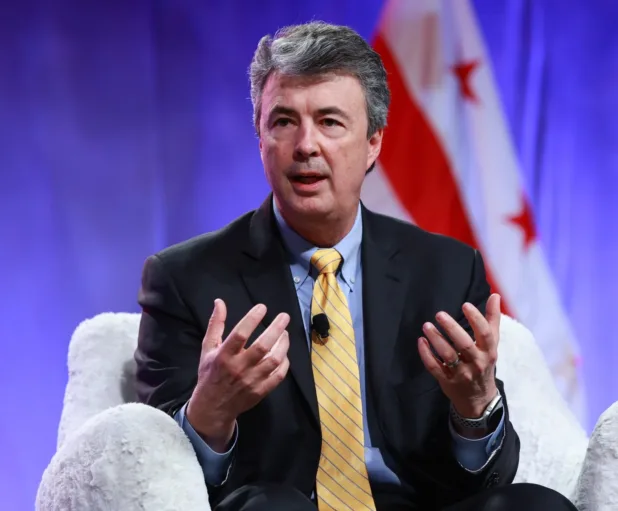Alabama Can’t Prosecute People For Out-Of-State Abortions, Judge Rules
Alabama’s attorney general said he would charge abortion funds for helping people end their pregnancies in other states. On Monday, a federal judge said doing so would violate the U.S. Constitution.

A federal judge ruled on Monday that Alabama cannot prosecute people for obtaining abortions in another state where the procedure is legal.
“Alabama’s criminal jurisdiction does not reach beyond its borders, and it cannot punish what its residents do lawfully in another State,” wrote Judge Myron Thompson of the U.S District Court for the Middle District of Alabama.
The ruling could enshrine new protections against the criminalization of both pregnancy and mutual aid. Prosecuting people for helping others get legal abortions elsewhere “would violate both the First Amendment and the right to travel,” Thompson wrote.
The ruling came as part of a 2023 lawsuit filed against Alabama Attorney General Steve Marshall, who threatened to prosecute abortion funds for helping people end pregnancies in other states. Alabama bans almost all abortions, but some nearby states, including North Carolina and Virginia, still allow abortions up to a certain time.
“If someone was promoting themselves out as a funder of abortions out of state, that is potentially criminally actionable for us,” Marshall said during a 2022 radio appearance. “If there are groups promoting this as part of their services, we will be taking a look at that.”
Alabama-based abortion funds then sued, arguing that the attorney general’s comments show he intends to criminalize free speech and interstate travel. The groups, which include the Yellowhammer Fund and WAWC Healthcare, said Marshall’s threats forced them to stop funding out-of-state abortions.

Since the U.S. Supreme Court overturned Roe v. Wade three years ago, 12 states have effectively outlawed abortion. To prevent people from traveling to states where the procedure is legal, abortion opponents have tried to restrict interstate travel in a variety of ways.
In 2023, Idaho lawmakers created a new crime called “abortion trafficking,” which makes it a felony to “harbor” or “transport” minors to get abortions without parental consent. Since then, Tennessee enacted its own “abortion trafficking” law. Legislators in four other states have attempted to do the same. In Texas, at least 13 municipalities have banned people from transporting others through their jurisdictions to get abortions.
After Roe fell in 2022, the National Right to Life Committee, one of the oldest and most influential anti-abortion groups in America, also began circulating model legislation that suggested using Racketeer Influenced and Corrupt Organizations Act (RICO)-style laws to prosecute anyone “aiding or abetting” an abortion.
The following year, Georgia’s Attorney General levied racketeering charges against activists and bail fund organizers who had sent Cop City protesters near Atlanta mutual aid for food and supplies. Similarly, Marshall claimed it is a “criminal conspiracy” to help someone pay for travel, lodging, and healthcare to end a pregnancy. He then threatened to prosecute abortion funds for helping pregnant people.
For the time being, Judge Thompson’s decision shuts the door on those tactics in Alabama. Tennessee’s ban is also being challenged in court.
“What the Alabama case—and every abortion case we’ve seen since Dobbs—illustrates is just how confusing the current legal landscape is and how that confusion creates fear and perpetuates stigma,” said Elizabeth Ling, senior helpline counsel for If/When/How, a reproductive-focused legal aid network that runs the Repro Legal Helpline. “Every day on the Helpline, we hear questions like whether it is a crime to travel to another state for abortion care, to help a loved one do so, or if it’s even safe to confirm a pregnancy in a state that bans or severely restricts abortion.”
The U.S. Department of Justice also weighed in on the case last year. In an August court filing, DOJ attorneys argued the state can’t stop people from crossing its borders.
“The Alabama AG’s threatened criminal prosecutions violate a bedrock principle of American constitutional law,” DOJ attorneys wrote. “States cannot criminalize interstate travel to engage in lawful conduct, nor can they criminalize assistance for such travel.”
In their lawsuit, healthcare providers asked the court to ban Marshall from prosecuting abortion funds and let reproductive justice organizations resume helping people obtain abortions in other states. Thompson declared that the state can’t arrest people who help others leave Alabama to end their pregnancies—but he refrained from issuing a formal injunction blocking Marshall from filing charges. Thompson said the judgment alone should prevent Alabama’s top prosecutor from criminalizing abortion funds, especially since Marshall already agreed to follow the judge’s rulings.
Marshall previously contended in court that helping others get out-of-state abortions amounts to a “criminal conspiracy” to circumvent Alabama law. He further argued that the First Amendment does not protect speech used to conduct a crime.
Thompson disagreed.
“The Attorney General’s characterization of the right to travel as merely a right to move physically between the States contravenes history, precedent, and common sense,” Thompson wrote in his decision. “Such a constrained conception of the right to travel would erode the privileges of national citizenship and is inconsistent with the Constitution.”
Thompson’s ruling also lets mutual aid networks rest easy—for now. Since the judge declared that interstate abortion travel is legal, Alabama prosecutors cannot currently charge people for funding it.
“I think what this demonstrates in part is that anti-abortion activists are struggling with the work that advocates and organizations have done to fill gaps and get people the care that they need,” said Dana Sussman, senior vice president of Pregnancy Justice, a nonprofit that defends pregnant people from criminalization. But Sussman cautioned that the fight’s not over.
“There’s just no shortage of laws that can be used to criminalize people for their pregnancies—the network of laws that exist today versus 1973 is massively expanded,” Sussman told The Appeal. “The truth of the matter is there are criminal laws on the books—like conspiracy or RICO—that can be used to criminalize conduct in ways that were never intended to apply in the context of pregnancy.”
